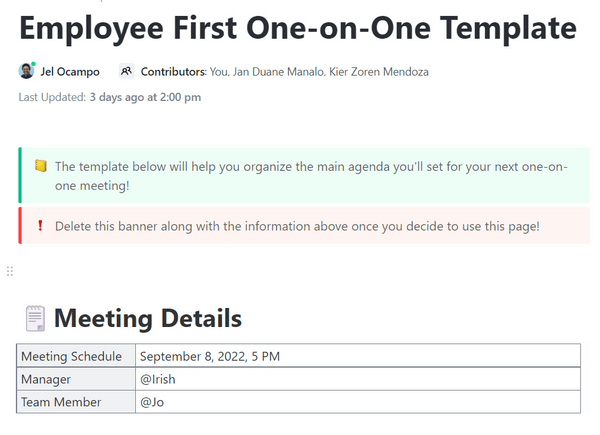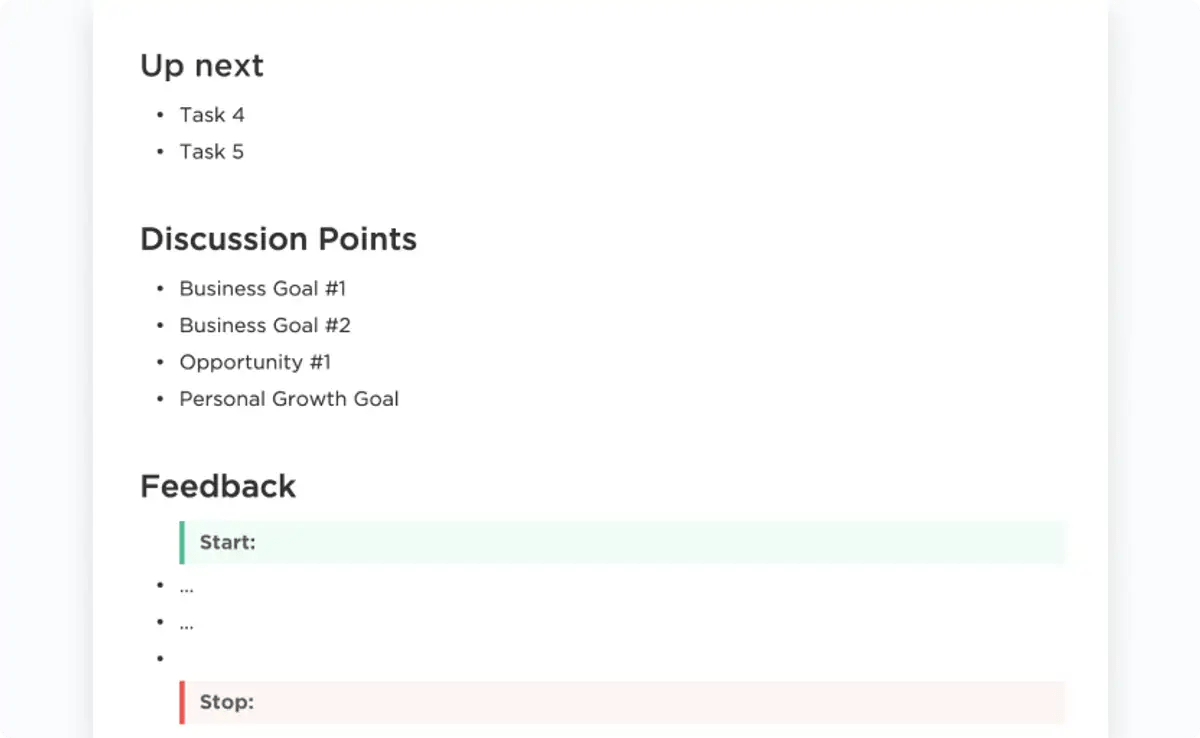

Some managers are born, others are made. And then there are those who choose to stay out of management entirely. After all, herding a colorful cast of characters in a diverse team setup may not be your cup of tea—and that’s okay.
You’d rather just do your own thing and call it a day minus the management responsibilities. But working alone doesn’t mean that your career has hit a dead end. If anything, individual contributors (ICs) drive efficiency and innovation within organizations.
So, if you’re on the lookout for a career that balances autonomy and expertise, read on. We’re about to explore the work of individual contributors, unpacking the essential skills, career paths, challenges, and strategies to thrive in this fulfilling and rewarding role. So, read on to learn how to become an individual contributor.
- Who’s an Individual Contributor?
- Skills, Characteristics, and Qualities of a Successful Individual Contributor
- The Role of Individual Contributors
- Journey of an Individual Contributor
- Individual Contributors vs. Managers
- Transitioning From Individual Contributors to Managers [or Vice Versa]
- The Challenges Faced by Individual Contributors and How to Overcome Them
- A Detailed Look at the Role of ClickUp in Supporting Individual Contributors
- How Great Leaders Can Empower Growth for Individual Contributors
- Individual Contributors for Organizational Growth
- FAQs
Who’s an Individual Contributor?
Not all heroes wear capes—some code, write killer copy, or design stunning visuals.
These are your individual contributors.
As the name suggests, an individual contributor is one who independently supports the organization’s goals and mission. They save the day by swooping in with specialized talent and expertise, focusing on completing specific tasks within a project or an organization.
They may function individually or as a part of the team structure with someone to report to in a hierarchy. However, they are not responsible for managing anyone else except for themselves. At best, they collaborate with different teams and share their knowledge and insights wherever appropriate to drive successful outcomes.
Skills, Characteristics, and Qualities of a Successful Individual Contributor
Now that you understand who an individual contributor is, let’s dig deeper into what constitutes individual contributors. To do this, let’s view them through the lens of individual contributor skills, characteristics, and qualities. Here’s a quick walk-through of what makes a good individual contributor:
Specialized skills
Individual contributors are subject matter experts. As such, they possess deep knowledge and cultivate areas of expertise. This could be a programming language in the case of developers, financial analysis software for an accountant, or a design tool for a graphic designer—you get the gist. Such specialized skills enable them to:
- Solve complex issues and deliver high-quality results efficiently, autonomously, and by using the right tools
- Drive innovation and out-of-the-box thinking by injecting creativity and fresh perspectives into problem-solving
- Guide teams, act as mentors, share resources, and foster a culture of knowledge-sharing
Organization

Staying on top of deadlines and efficiently managing deadlines requires sharp organizational skills. Without this critical skill, chaos would reign supreme — especially if the individual contributor is involved in multiple tasks and projects. By staying organized, individual contributors can:
- Sort through tasks, identify critical elements, and prioritize effectively to ensure timely task or project completion
- Keep track of tasks, deadlines, and resources to manage workloads efficiently and maximize productivity
- Stay on top of their deadlines and deliver to commitments for fostering an environment of trust and reliability
Self-management
Individual contributors have to juggle multiple tasks without constant supervision. At the same time, they must meet respective deadlines and always deliver to expectations. This means that organization is just one part of the skills they must possess. Individual contributors must also have the self-management skills to thrive independently as it will:
- Keep them motivated to set goals, manage their time, and hold themselves accountable for their own tasks
- Eliminate distractions and define clear priorities to keep them focused on the task at hand, even while facing unexpected challenges or changes
- Cultivate discipline by avoiding distractions and procrastination to deliver against established deadlines
Communication
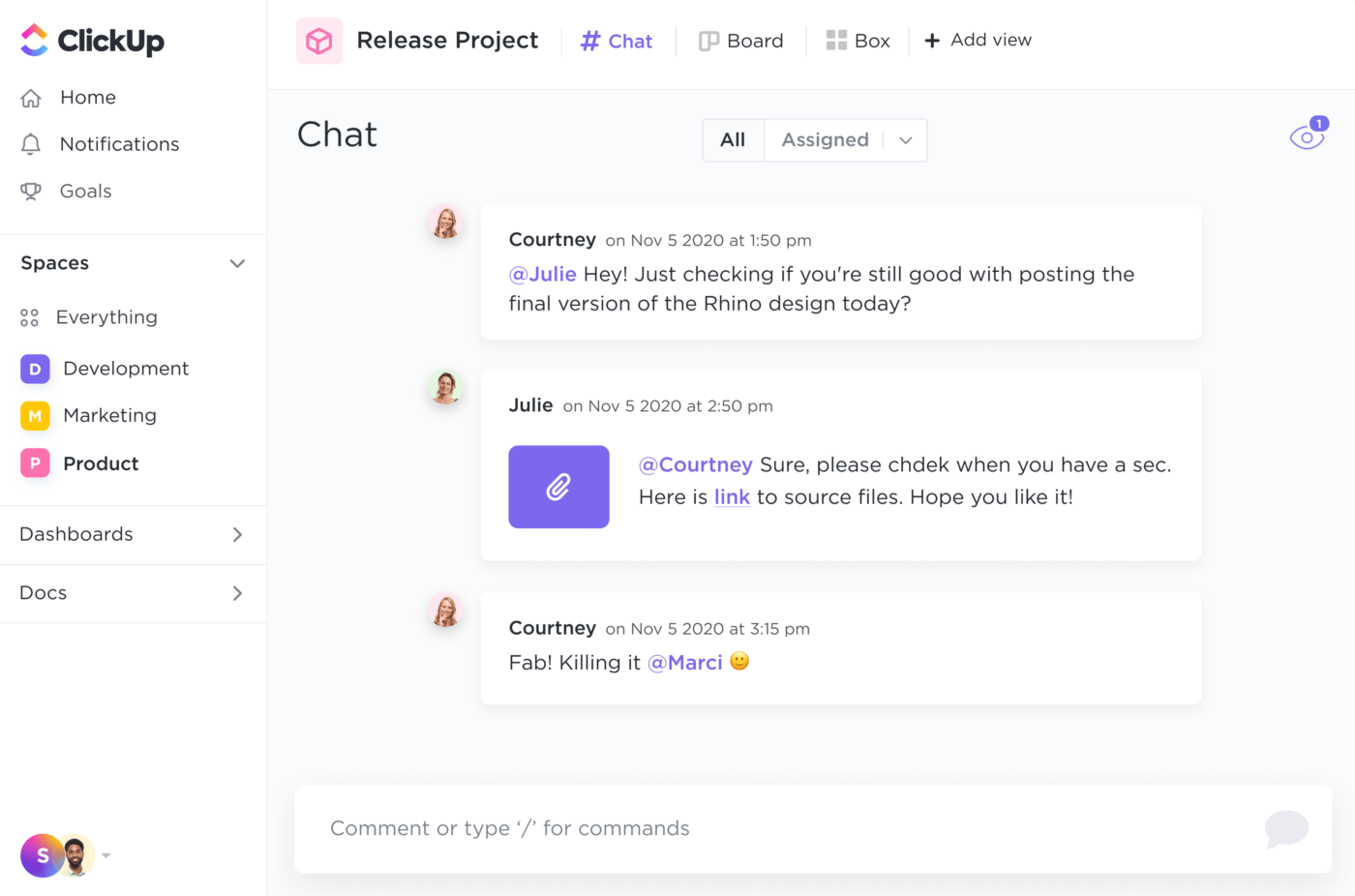
While individual contributors may not occupy managerial positions, they’re still a part of the team—or at least have to work closely with one. This means that they must possess strong communication skills to work alongside other team members. Clear and concise communication is a key soft skill that:
- Smoothens information exchange and prevents misunderstandings by ensuring everyone’s on the same page
- Keeps managers and stakeholders informed on the progress, status, challenges, and key decisions surrounding a project
- Facilitates sharing of ideas, technical concepts, and possible solutions based on subject matter expertise with other employees
Collaboration
Despite their independent work style, individual contributors don’t function in a vacuum. They are responsible for specific tasks or outcomes, which would require them to collaborate with other teams. They also understand their role in the larger set of objectives. Here’s where team collaboration comes into play:
- Sharing knowledge and expertise with junior colleagues to develop a skilled and informed workforce
- Approaching problems from diverse angles and perspectives to devise creative and effective solutions
- Integrating with cross-functional partners to ensure a smooth workflow and achieve shared goals
Consistency
Consistency is the hallmark of successful individual contributors. It demonstrates how their positive results are not occasional bursts of brilliance or a stroke of luck but based on the reliable delivery of high-quality work time and again. When you deliver consistent results, you:
- Strengthen relationships within the organization by cultivating trust and reliability amongst clients, project managers, and colleagues
- Improve project planning as consistent performance alerts teams and managers on what to expect
- Minimize efforts by following established processes and maintaining focus to uphold overall quality and avoid rework
Problem-solving
As we’ve mentioned before, individual contributors discover innovative ways to solve problems. This stems from their expertise in their domain, with problem-solving acting as a key trait to consolidate the individual contributor role. Their critical thinking and problem-solving skills help in:
- Analyzing complex situations, identifying root causes or underlying problems, and developing reasonable solutions
- Discovering new and unexplored ways of working, which optimizes existing workflows or leads to advancements in their field
- Adapting to unexpected situations and changing priorities, making them more resilient, even in a highly dynamic environment
Initiative and ownership

Successful individual contributors go beyond completing assigned tasks. Their ability to undertake complex initiatives and absolute task ownership helps them:
- Discover areas of improvement and untapped opportunities, along with innovative solutions for even more complex initiatives
- Stay motivated as task ownership fosters a sense of pride in their work, which drives them to go beyond excellence
- Embrace continuous learning and development that contributes to their personal and organization’s success
Continuous learning
Even though they possess specialized knowledge, individual contributors must keep up with the ongoing trends and requirements of their respective areas of expertise or industry. This bolsters their individual contributor role as they can:
- Stay ahead of the curve and leverage new technologies, tools, and trends in their favor
- View challenges, roadblocks, and failures as an opportunity to learn and improve
- Become a knowledge hub of the latest and the best to steer projects and share knowledge
The Role of Individual Contributors
Given the above skills and qualities of individual contributors, here’s a summary of what they bring to the table:
- Rich expertise: As specialists in their chosen field, they possess a well-developed and highly refined skill set that is crucial to the organization’s success. They play a mission-critical role in tackling complex tasks efficiently and deliver high-quality results at all times
- Accountability: Individual contributors assume ownership of their assigned projects or tasks. Being personally responsible for a task or a project drives up the stakes, inspiring individual contributors to deliver exceptional results
- Collaboration: Even though theirs is not a management position, individual contributors work closely with colleagues across teams to unify the organizational structure. They share knowledge, solve problems, and bring everyone closer to shared goals
Journey of an Individual Contributor
The journey of an individual contributor involves honing specialization, cultivating expertise, continuous learning, and increasing organizational impact. Here’s an illustration of a typical individual contributor career path:
| Job Titles | Level 1: Entry-Level IC | Level 2: Associate IC | Level 3: Mid-Level IC | Level 4: Senior IC | Level 5: Principal IC |
| Focus | Developing foundational skills | Applying foundational skills and gaining experience | Expanding skillset and working on more complex projects | Deep specialization to become a subject matter expert | Thought leadership and strategic influence |
| Responsibilities | Completing assigned tasks under close supervision | Independently completing assigned tasks and contributing to small-scale projects | Leading projects on a small scale, mentoring junior colleagues, and contributing to strategic decisions | Managing complex projects, troubleshooting critical issues, and guiding junior and mid-level ICs | Leading large-scale initiatives, mentoring senior ICs, and contributing to the industry through thought leadership |
| Experience | Freshers with minimal experience | 1-2 years of experience in the field | 3-5 years of experience in the field | 5+ years of experience in the field | 8+ years of experience in the field, along with recognized expertise |
| Key Skills | Understanding job requirements Following instructions Basic functional or technical skills relevant to the field | Proficiency in core skills Problem-solving for routine tasks Basic communication and collaboration | Advanced functional or technical skills Problem-solving for complex tasks Effective communication and collaboration | In-depth expertise Innovative problem-solving Strong communication and collaboration skills Influence decision-making | Unparalleled expertise Strategic thinking Exceptional communication and collaboration skills Potential leadership qualities |
| Examples | Junior Developer Content Writing Assistant Graphic Design Intern | Web developer Content Marketing Associate Graphic Designer | Software engineer Content Marketing Specialist Senior Graphic Designer | Lead Developer Content Marketing Manager Creative Director | Technical Architect Head of Content Marketing Design Principal |
Individual Contributors vs. Managers
While you may notice some overlap between individual contributors and first-time managers, the two profiles are vastly different. Just because an individual contributor possesses mastery over a specific skill doesn’t automatically promote them to a managerial role. Similarly, managing projects doesn’t automatically make someone an individual contributor.
Here’s a high-level comparison between individual contributors and managers:
| Feature | Individual Contributor | Manager |
| Primary Focus | Functional or technical expertise in a well-defined field of work | Team or project management and leadership |
| Key Responsibilities | Completing the assigned task or project | Assigning tasks, monitoring progress, building a team and guiding it, capacity building, etc. |
| Critical Skills | Deep functional/technical skills Problem-solving Communication Collaboration | Leadership skills Delegation Conflict resolution Emotional intelligence Motivation People management |
| Supervision | Operates independently with minimal supervision | Manages a team of ICs |
| Career Path | Advancements based on expertise and individual contributions | Advancements based on leadership qualities and project management capabilities |
| Progression | Deeper specialization, which may transition to leadership roles | Team leadership, which may transition to senior management roles |
| Impact | Contributes through individual outputs | Contributes through individual efforts and team performance |
| Examples | Software Developer Content Writer Graphic Designer | Project Manager Head of Content Team Lead |
Transitioning From Individual Contributors to Managers [or Vice Versa]
Even though the role of an individual contributor and manager is distinct, it carries certain similarities. This opens up the possibility to go from individual contributor to people manager and vice versa.
Here’s how you can go about it:
Individual contributors -> People managers
You can climb the corporate ladder to go from being an individual contributor to a management role by:
- Expressing an avid interest in taking on leadership responsibilities within your existing role
- Developing leadership skills by taking on projects that require mentoring junior colleagues
- Participating in leadership development programs and learning from effective managers within the organization
- Honing broader skills such as delegation and development, interpersonal communication, strategic thinking, conflict resolution, and emotional intelligence
- Understanding team members’ strengths and weaknesses and allocating tasks accordingly for effective team management
- Demonstrating your ability to manage projects, stick to deadlines, prioritize tasks, and motivate colleagues
People managers -> Individual contributors
While uncommon, you may choose to revert from a manager to an individual contributor role by:
- Explaining the reasons for transitioning from a managerial role back to the role of an IC
- Signing up for refresher courses or hands-on projects related to your specialized work to update your functional and technical skills
- Reconnecting with colleagues in IC roles to stay updated on industry trends
- Tapping into your prior experience as an IC to brush up your deep knowledge and problem-solving abilities
The Challenges Faced by Individual Contributors and How to Overcome Them
Individual contributors form the backbone of every organization. However, that’s not to say that their path is not riddled with obstacles. Here’s a closer look at some of the key challenges they face, along with some possible solutions:
Challenge 1: Missing the motivation mark
Staying self-motivated and engaged can be a significant challenge to ICs, especially for those who crave a strong sense of purpose. While they recognize the importance and impact of their work, the absence of a formal leadership job title may leave them wanting more. They may feel like they’re living under the shadows of their manager, who will get credit for their individual contributions. Such lack of visibility, paired with the lack of structure to their professional development, may dampen motivation.
Solutions
- Seek out ways to contribute meaningfully and strategically beyond immediate tasks
- Establish personal goals to acquire new skills and deepen expertise
- Celebrate personal achievements to maintain a sense of progress as you execute projects
Challenge 2: Clueless collaboration

Individual contributors often thrive on autonomy and deep focus. However, they are also meant to collaborate with other team members. Striking this perfect balance between independence and interdependence can get tricky.
On the one hand, it may result in siloed work and missed opportunities for knowledge sharing. On the other hand, getting involved in too many collaborative tasks can throw ICs off their game by preventing them from reaching deep focus.
Solutions
- Share regular updates with team members and actively seek feedback on various strategies or interventions
- Actively participate in team meetings, share your expertise, and offer mentorship to junior colleagues
- Set up reliable and diverse channels for synchronous and asynchronous communication
Challenge 3: Vanishing visibility
While ICs may focus their effort and expertise on a particular project or task, gaining the required recognition from stakeholders or project leaders can be a cutthroat fight for attention. Their accomplishments, big or small, may easily get buried, especially for large and complex projects involving several team members. Not gaining the credit they deserve may discourage and disengage them and hamper their career development.
Solutions
- Document all the tasks completed, problems solved, and other noteworthy achievements
- Update the manager on the progress made so far while also highlighting any key achievements in direct reports or presentations
- Network with colleagues and stakeholders to showcase expertise and value
Challenge 4: Change is constant
Certain fields and industrial sectors are in a state of flux. This dynamic nature puts pressure on the IC to evolve continuously with changes in the industry. From keeping up with the trends to upgrading the skillset, staying relevant in a fast-paced environment is extremely exhausting. Squeezing in the time to upskill while juggling deadlines and workloads hinders growth at either end.
Solutions
- Embrace a culture of continuous learning and dedicate time to attending workshops, online courses, webinars, industry conferences, etc.
- Seek out mentorship from senior colleagues or industry experts
- Stay up-to-date on industry trends by reading credible publications, participating in forums, and networking with other professionals
Challenge 5: Workload woes
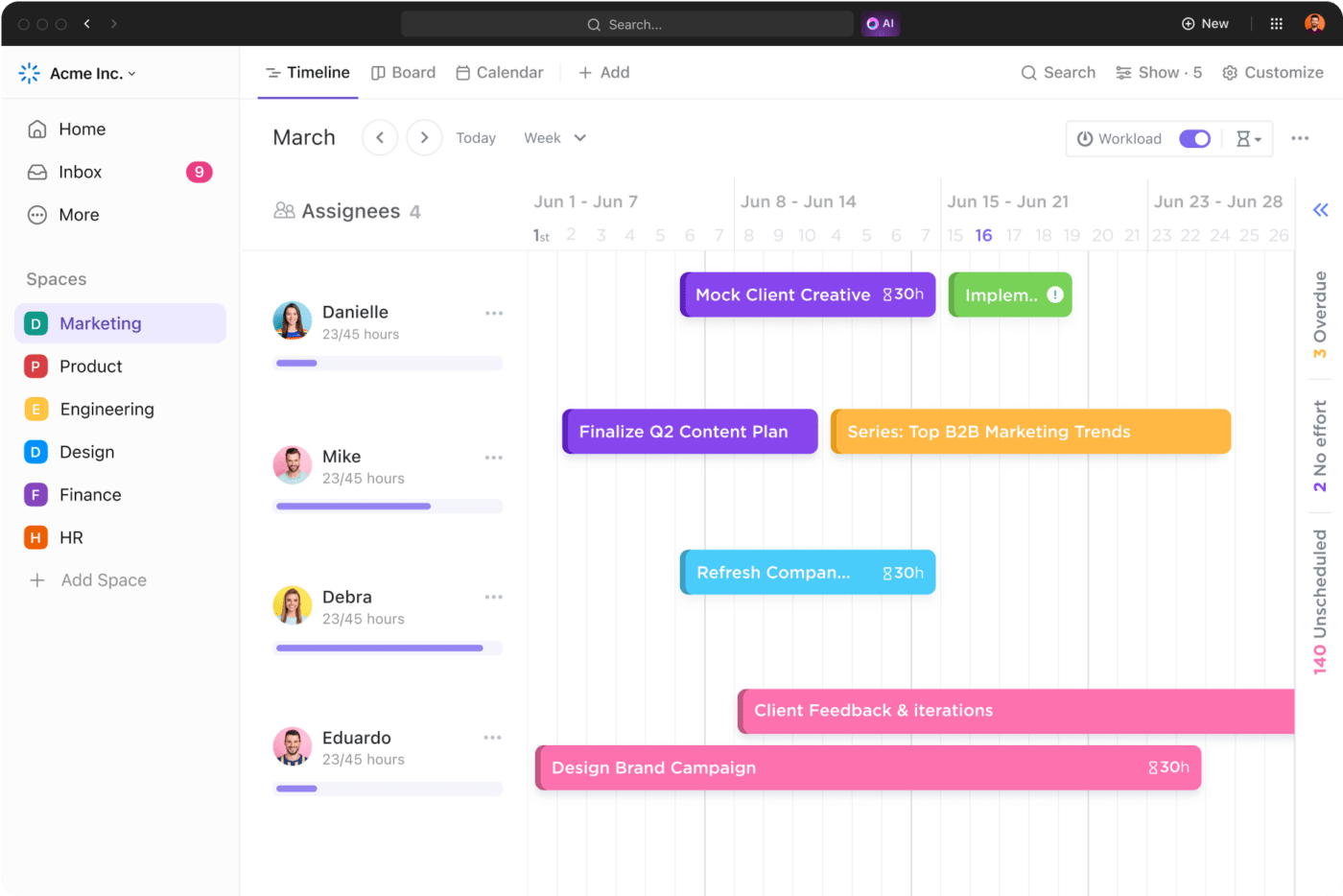
Individual contributors have to take charge of several things—deadlines, deliverables, and quality. Managing these along with their workloads may brew a continuous struggle. ICs may quickly feel flooded, stressed, and overwhelmed without time management and organization skills. This cripples their ability to deliver top-notch work and feeds burnout.
Solutions
- Develop strong time and workload management skills to prioritize tasks and deliver results
- Communicate any workload concerns to your manager while being transparent about your capacity and availability
- Schedule periodic breaks and prioritize personal well-being to maintain a healthy work-life balance
A Detailed Look at the Role of ClickUp in Supporting Individual Contributors
Although ClickUp is well-known for its project management prowess, there’s more to it than just that. For instance, it can be a powerful self-management tool for individual contributors, allowing them to excel in their respective fields.
Here’s a breakdown of how ClickUp helps individual contributors achieve more:
Enhanced organization

ClickUp makes organization a breeze. You may create dedicated Spaces for different projects and list their respective tasks. Break down complex tasks into smaller, more manageable subtasks and assign deadlines and priorities to them. This helps you create a clear roadmap of your day-to-day work and ensures that nothing slips through the cracks.
Plus, the multiple Views on ClickUp allow you to visualize your workload your way. From Kanban-style boards to interactive lists, ClickUp truly enables ICs to work independently and autonomously!
Greater visibility
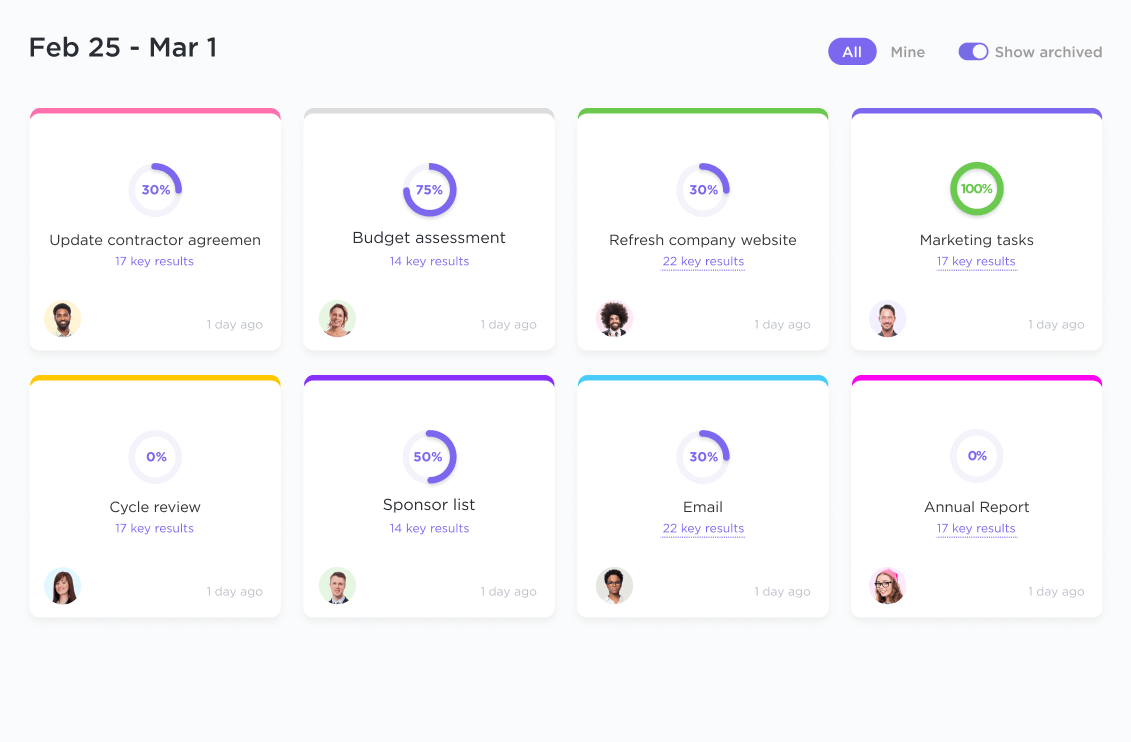
Do you feel like your individual contributors go underappreciated? Try ClickUp Goals. These tie the IC’s personal and professional goals with the overarching organizational goals. Gaining visibility into how your individual contribution culminates into business success will prevent you from feeling like a cog in the wheel and motivate you to do more.
At the same time, the ability to track goals allows project managers to celebrate milestones and achievements. This encourages ICs to accomplish more and commit to self-improvement.
Also Read: How to set goals for your team using ClickUp
Effortless collaboration

ClickUp is the very foundation of collaboration. For starters, you have the ClickUp Chat View that allows you to chat with other team members in real time. Use it to obtain instant inputs or share progress updates. You can even turn messages from the Chat View into tasks and add them to your list.
Similarly, you have ClickUp Whiteboards, where you can collaborate with your team to build interactive mind maps and flowcharts. ClickUp brings all stakeholders together, regardless of their location.
Eliminate the need for lengthy written explanations with ClickUp Clips. Record your screen to visually demonstrate ideas, provide feedback on tasks, or walk through processes. Clips helps you give updates quicker and clearer, freeing up valuable meeting time for more in-depth discussions.

Pro tip: Use ClickUp Brain to transcribe the recordings made with ClickUp Clips. You can also add comments directly to the Clips for further discussion and keep everything organized within ClickUp.
Knowledge sharing and growth
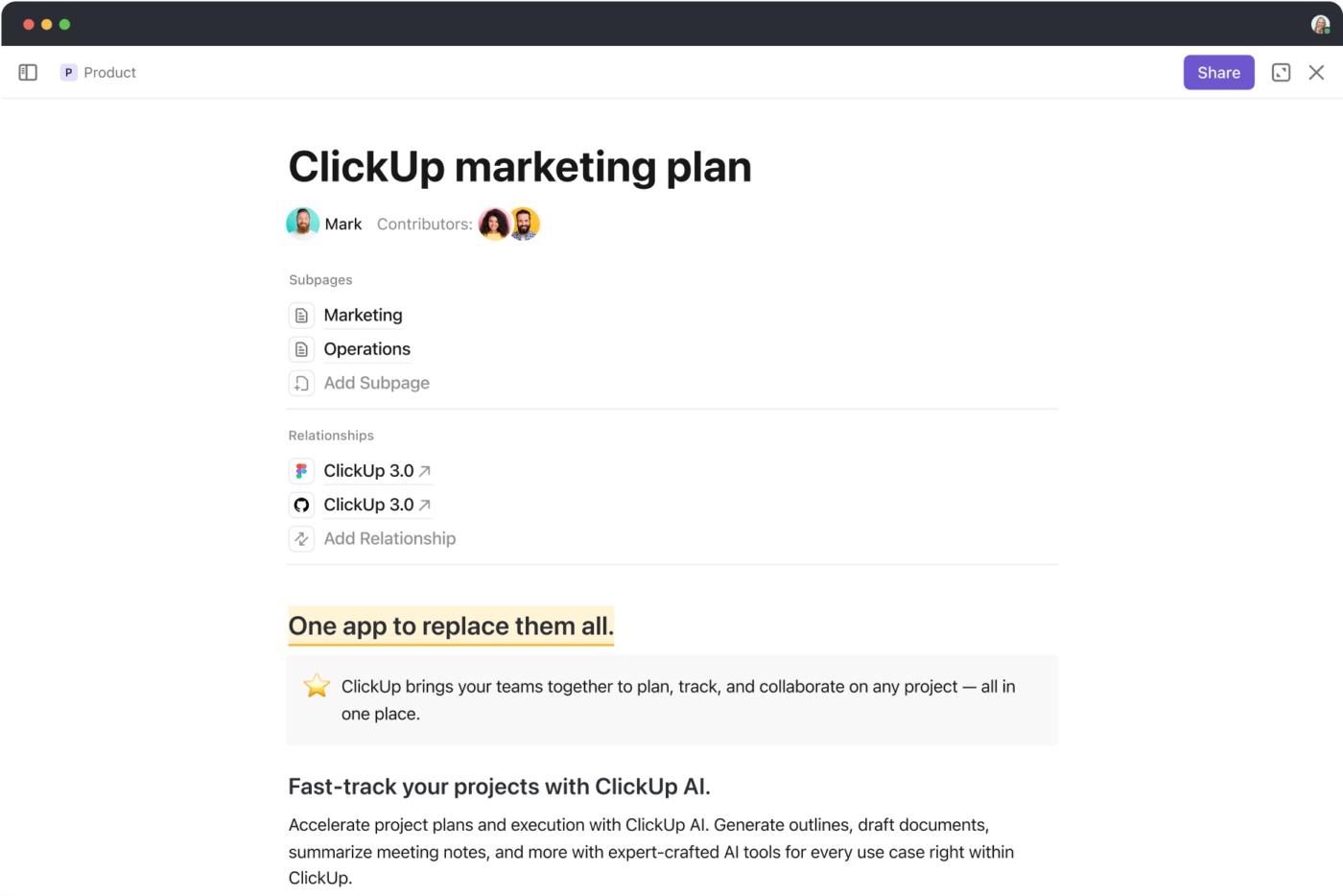
Knowledge sharing is one of the key responsibilities of an individual creator. To facilitate this, experienced ICs can use features like ClickUp Docs to create a centralized repository of essential documents.
From easy-to-navigate Wikis to Standard Operating Procedures (SOPs), ClickUp Docs hosts an assortment of documents required to train, enable, and empower the next generation of ICs. These docs also double as collaboration tools as teams can come together to create, edit, and organize them!
Workload management

ClickUp makes workload management less of a load. ClickUp’s Team and Personal Views grant a bird’s-eye view of all the assigned tasks across different projects. This allows ICs or managers to view workload in context and identify any potential bottlenecks or resource competition even before they arise.
The ClickUp Dashboards allow ICs, teams, and managers to keep a finger on the pulse of project execution. This central hub displays key metrics like deadlines, work completion rates, etc., to highlight areas that require personal attention or intervention.
AI-powered assistance

ClickUp Brain delivers an elevated experience to individual contributors. It is a virtual assistant that anticipates their needs, uncovers relevant information across various projects and documents, and streamlines communication.
With this combination of capabilities, ClickUp Brain empowers ICs to work smarter, not harder. By offering contextual suggestions, improving their writing, facilitating knowledge sharing, and automating repetitive tasks, ClickUp Brain unlocks a new plane of efficiency that frees up ICs to focus on more high-value tasks.
How Great Leaders Can Empower Growth for Individual Contributors
Given that ICs are the foundational building blocks of any growing organization, great leaders often focus on developing a nurturing environment for them. Here’s what they do to create a supportive work environment for individual contributors:
- Provide various opportunities for skill development through training, conferences, or certifications to help ICs stay sharp and relevant in their field. Such skill development efforts will help ICs gain valuable experience that catalyzes their personal and professional growth as well
- Encourage a culture of knowledge sharing, peer mentoring, and dedicated learning to develop a growth mindset. If holding such sessions is challenging, use templates like One-on-One on ClickUp to conduct personal performance reviews on individual and team goals. The template guides one-on-one meetings between managers and employees, ensuring all important topics are covered. They open dialog between managers and ICs and bring them on the same page. Tracking and benchmarking progress in this manner cultivates trust, boosts communication, and drives collaboration
- Involve ICs in the decision-making process to cultivate a feeling of purpose and ownership. Assigning challenging projects or delegating tasks strategically may encourage ICs to step outside their comfort zone and keep things interesting for them
- Schedule periodic performance reviews to analyze the role, impact, and contributions of an IC. Use the Performance Review Template on ClickUp to visualize and measure performance. This template streamlines the process of sharing feedback, celebrating achievements, and acknowledging individual contributions without adding to the administrative loads. Use it to motivate your ICs
- Remind ICs of the organizational and group goals and the high-level strategy to achieve these. Staying informed of the bigger picture allows them to visualize their role in the larger scheme of things and motivates them to go the extra mile
- Nourish this trait by delegating tasks. Although collaboration is a part of their job, ICs flourish in autonomy. Establish clear expectations and trust them to tap into their expertise to complete the task as per these pre-defined parameters. Such an environment devoid of micromanagement fosters a sense of ownership and responsibility
- Encourage ICs to propose new ideas and solutions. This will challenge them to stay innovative while making them feel involved in the work at hand. Use this opportunity for reverse mentoring, where the ICs share their specialized knowledge with leaders
- Consider promoting ICs to leadership positions when they become available. Such a strategy demonstrates your organization’s commitment to advancing the IC’s career. At the same time, it will boost retention among ICs who possess a strong understanding of the organization and demonstrate leadership qualities
- Offer ICs collaboration opportunities with cross-functional teams from different departments on projects. Doing so will expose them to diverse perspectives, expand their knowledge base, and develop a deeper sense of belongingness and teamwork within the organization
- Offer them flexible work arrangements like remote working opportunities, flexible hours, compressed workweeks, etc. This kindles their sense of trust, caters to their need for autonomy, and promotes a healthy work-life balance
Individual Contributors for Organizational Growth
The role of an individual contributor is multi-faceted, which is why they exist across industries and businesses of all shapes and sizes. It requires specific functional and technical expertise, problem-solving skills, and the ability to thrive in an environment that blends autonomy with collaboration.
While challenges like diminished visibility and dynamic changes in the industry persist, there are ways to overcome them.
Investing in the right tools can amplify ICs’ impact on business outcomes. Platforms like ClickUp are great enablers of their success and yield multi-fold returns on the initial investment.
ClickUp helps ICs visualize their roles and impacts. It also allows teams to collaborate for improved performance.
Most importantly, ClickUp is as versatile as an individual contributor. This allows the tool to adapt to changing requirements while fueling a learning culture. Together, they can propel a business to new heights.
Sign up for free today to witness the transformative role of ClickUp!
FAQs
What is an example of an individual contributor?
An Individual Contributor (IC) may exist in various departments across different organizations. Here are a few examples:
- Content Writer: Creates engaging content like blog posts, website copies, social media posts, newsletters, and other marketing collateral
- Software Developer: Writes code, builds features, and troubleshoots technical problems
- Data Scientist: Collects, analyzes, and interprets data to derive insights that may help solve problems
- Graphic Designer: Designs brand logos, infographics, images for blogs, and other visual elements for marketing materials or platform user interface
- Financial Analyst: Analyzes financial data, creates reports, and recommends investments based on financial goals, budget, risk appetite, and other factors
How do you become an individual contributor?
You can achieve your career goal of becoming an individual contributor by:
- Earning a relevant degree or completing a certification course required to acquire the foundational skills for the chosen field
- Gaining experience in the relevant field through internships, freelance projects, or by occupying entry-level positions to build a strong portfolio
- Building working relationships with other professionals in your field and networking at online and offline events to learn of opportunities
- Customizing your resume and cover letter to highlight your skills and experiences relevant to a specific IC role that you may be interested in
Is it okay to be an individual contributor?
Absolutely! Embarking on a journey to become an individual contributor leads you through an exciting path that offers opportunities for:
- Developing expertise in a specific field
- Mastering new skills and learning continuously
- Following a predictable schedule to enjoy a healthy work-life balance
- Taking ownership of your work
These make individual contributions one of the most highly sought-after career goals.
What makes a great individual contributor?
Qualities of a great individual contributor include:
- Strong functional and technical skills
- Problem-solving abilities
- Communication and collaboration skills
- Time management skills
- Task management and organization skills
- Initiative and task ownership
- Self-motivation
What level of job is an individual contributor?
The role of an individual contributor may exist at various levels within an organization—from entry-level to senior experts. The specific level depends on the skills required, relevant experience, and the impact within the organization. One can even transition into managerial roles after acquiring a wider skill set.




